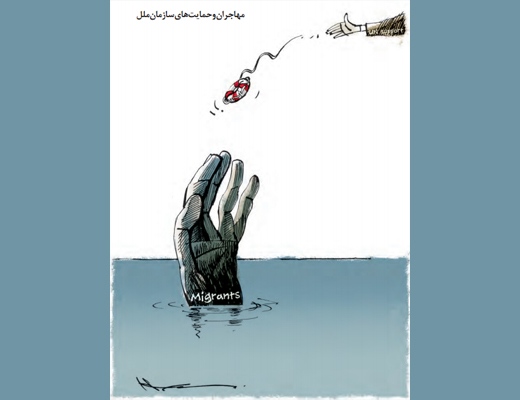More than 4,000 migrants have landed in Indonesia, Malaysia, Thailand, Myanmar and Bangladesh since Thailand launched a crackdown on people-smuggling gangs this month. The United Nations says around 2,000 may still be adrift in boats on the Andaman Sea and Bay of Bengal.
Myanmar’s Rohingya minority and immigrants from Bangladesh have set sail to flee persecution, but they have faced unchartered waters out at sea. The influx of the persecuted Rohingya migrants has turned into a cause for international concern. There have been calls for global efforts to help the vulnerable “boat people” stranded in the region’s seas, but to date they have been of no avail.
Sharq daily on May 24 published Displacement – a descriptive piece of writing by Iranian writer Nahid Tabatabai – featuring the hopes and pains of migrants who leave their home country behind in search of a better tomorrow. The following is the translation of the piece in its entirety:
The swings of an old, moribund boat; sleeping at the dark, malodorous, [dingy] stowage below deck; the stench of dead fish; the wet, slimy stowage floor; stillness among hundreds of bone-tired, hungry and helpless people; a missing remedy; a dashed hope; sheer hopelessness; vagrancy and then – looking into camera – the face of a naked, emaciated boy who takes his loosely clenched fist toward his mouth;
The image of a little girl who has lain down in the pale [rays of] sun peeking through an opening on the stowage floor, curling up her frail legs in a fetal position and tucking them under her stomach; the fearful eyes of a woman that have seen the man’s severed head and remained bewildered and scared; behind the look on her face, there is a mind which has forgotten the agony of loss; bewildered by this much helplessness, she sits by her children;
A man’s eyes moistened by sea water and tears, hollow on a haggard face; adrift on the blue sea jostling for a bottle of water; ironically thirsty while surrounded by water; fear of losing a bite-size morsel; a hungry mouth which does not let go of the lid of an empty packet of food; sniffing the smell of food with no leftovers left behind; the smell of food mixed with the stench of rotten fish; the two-month body odor of [unbathed] displaced and underfed people; the smell of lassitude and fatigue; the reek of grief and despair; the [malodorous] smell of death; the [putrid] smell of oppression; the [pungent] smell of the oppressed; the [deep] whiff of homelessness.
The vile odor of human-to-human cruelty; and forgetfulness of the countenance of father and the hand of mother; the [gentle] caress of the morning breeze, the smell of freshly baked bread, the fragrance wafting through the kitchen; the freshness of [the refreshing] water slipping gently on the tongue; the serenity of [deep] sleep on their [comfortable, cozy] bed; the tranquility of head resting on a [soft] down pillow; the view of a baby feeling full; sighing [deeply] in relief; taking home the fruits of labor; swinging as high as the treetop; the refreshing taste of sweet basil; the heavenly aroma of watermelon; the amber hue of grapes; the view of the youth going through the growing spurt; the warmth of loving [someone] and being loved [back]; and the delicate scent of love, affection and tolerance.
Forgetting the kindness of living simple, eating, sleeping and laughing; forgetting everything good as if they had never existed; forgetting the human right of humans.
Myanmar, 2,000 people, two months, wandering at sea; and the swing of a pendulum hanging between fear and death.
